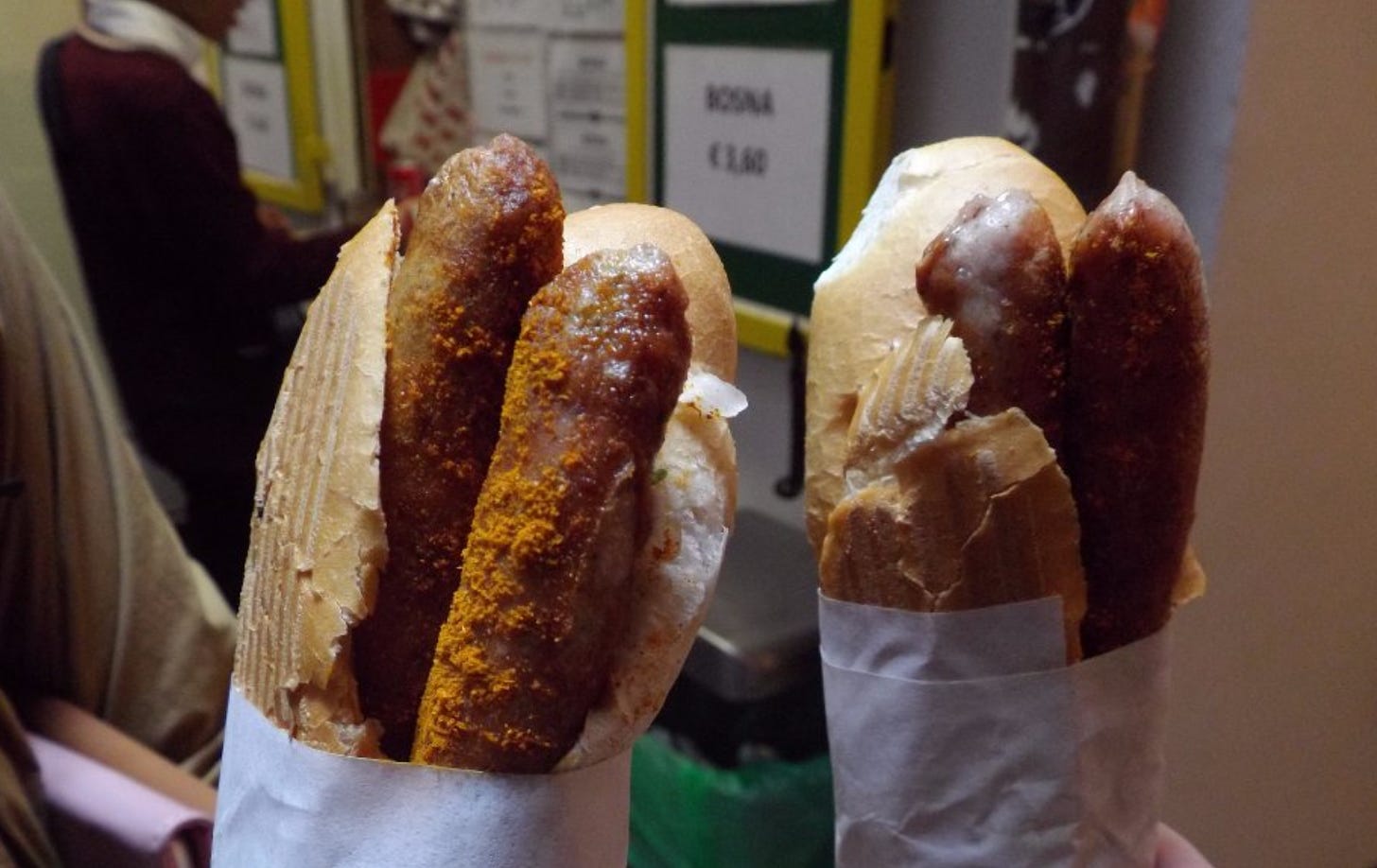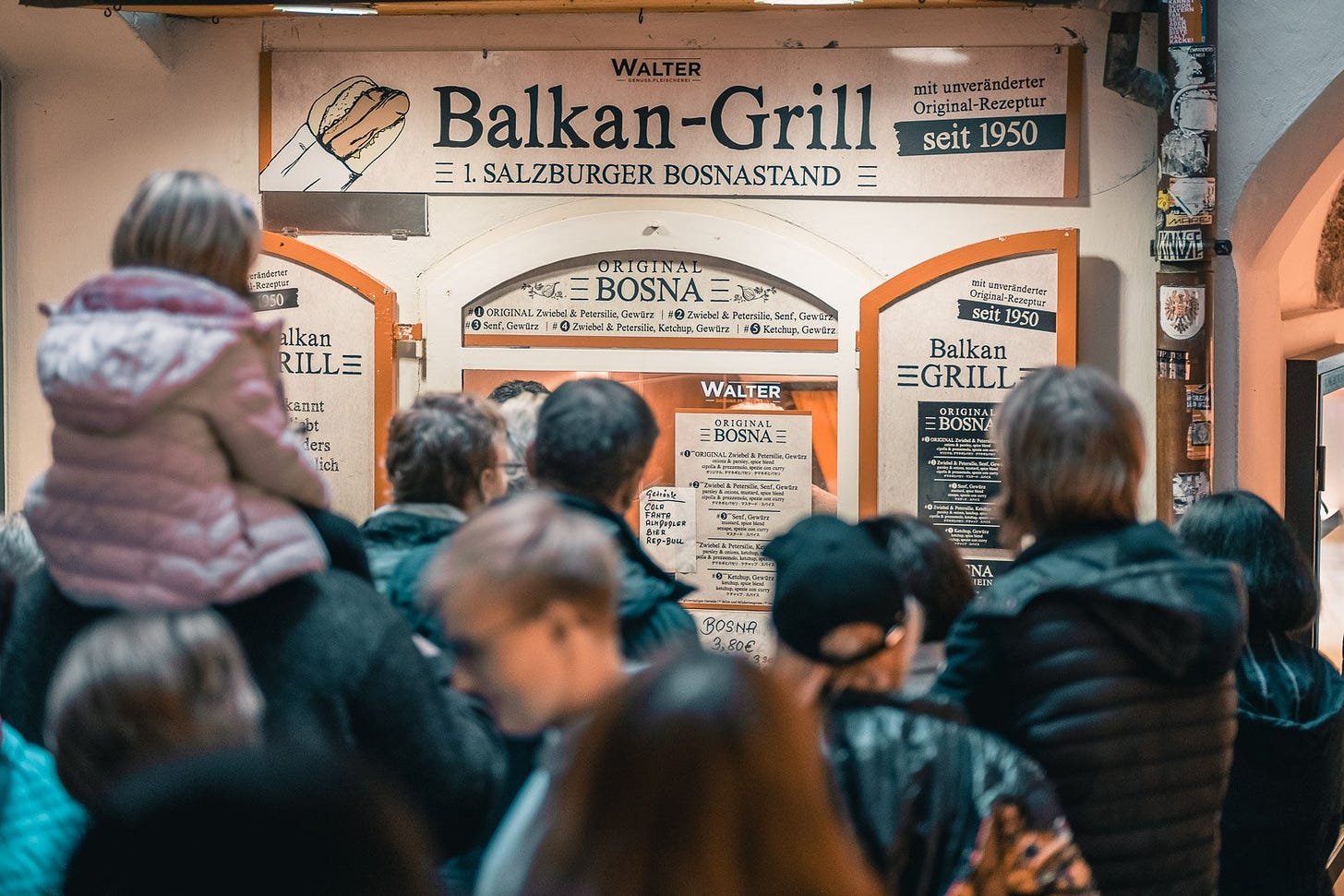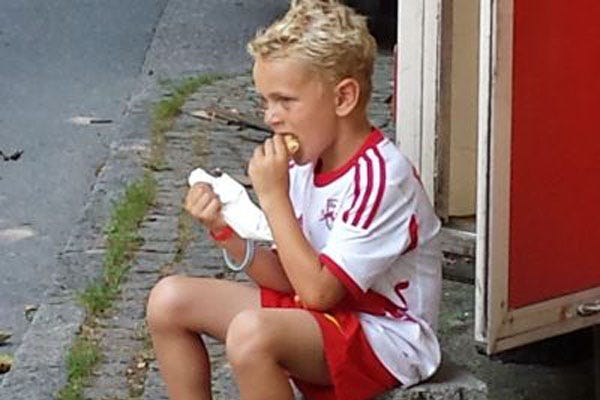Notable Sandwiches #16: How Do You Solve a Problem like the Bosna?
Unravelling a sausage mystery in the heart of Central Europe
This is the latest installment of Notable Sandwiches, the feature where I nibble through the strange and marvelous document that is Wikipedia’s List of Notable Sandwiches, in alphabetical order. This week: The Bosna, the staple street snack of Austria, named for a Balkan nation, using a German sausage, and invented by a Bulgarian. Perhaps.
In the world of information on the Internet, there is a fairly common and deeply confounding phenomenon that I’ve dubbed an “orphan fact.” It’s a little tidbit of knowledge that, having popped up somewhere, is repeated again and again, with no real indication of its true origin. There’s no primary source at the end of the line, no reassuringly yellowed document, or named and quoted authority. There are just webpages, cannibalizing each other, until a dubious “fact” muscles its way into certainty by the sheer force of echoing multiplicity.
In my former life as a fact-checker at the New Yorker, the fate of such orphan facts was grim. First, the chase—the meticulous tracking down of footnotes and cited sources until a reliable one could be found, or the enlistment of subject-matter experts who could aid in such an endeavor, anyone fluent in a relevant language. But if such a fact could not be granted a respectable lineage, it would be excised—stricken from the text, its truthfulness undiscoverable, and thus a thread that could weaken the whole fabric of a piece.
But now I am my own fact-checker, and fact-checking oneself is a bit like trying to scratch one’s own shoulder blades—a twisted and perhaps impossible task. So: I have been trying to chase down an orphan fact, while trying to write a story that builds around it, and between my sluggish midwinter lassitude and the genuine elusiveness of my quarry, I have only been able to give it the slenderest of roots.
Here’s the fact:
The Bosna sandwich, an Austrian street food of bratwurst with onions, spices, and curry-infused ketchup in a pressed white-bread bun, is believed to have been invented in Salzburg in 1949 by a Bulgarian expatriate named Zanko Todoroff.
Although Wikipedia is, generally, considered a rather deshabille source to formally cite, it is perforce our starting point, this being, after all, a project based on Wikipedia’s List of Notable Sandwiches. So I began there, at the second sentence of the Bosna article:
“It is believed to have been invented in 1949 by a man named Zanko Todoroff.[1]”
A footnote! A source cited! Good. It leads to TasteAtlas, a somewhat bewildering map-based collection of byline-free texts about global foods, where you can click on cheeses of the Azores and Ghanaian stews, and so on. Here is what they have to say about the Bosna:
“It is believed that the sandwich was invented in 1949 by a Bulgarian named Zanko Todoroff.”
No footnote. No source cited. This assertion is echoed across any number of English-language pages about food, worrying in its construction—never trust the passive voice! Believed by whom? Who started the rumor? Who was Zanko Todoroff?
I set off into the German web—mediated by Google Translate—to try to find out.
Some further strands of intel came together. A few. Details of the sandwich itself were a bit easier to find, it apparently being a very popular snack in Austria and Bavaria. Its genesis also became a lot more complicated. Victory has many fathers, and only one of them is Zanko Todoroff.
According to one German site, you can trace the Bosna’s origins to one particular address in Salzburg: the appropriately named Bosnastand, at Getreidegasse 33. The mysterious Zanko Todoroff allegedly plied his trade here, concocted his mysterious curry sauce, and originally named the sausage “Nadinizer,” which didn’t catch on. So he renamed it “Bosa,” after a popular fermented-millet drink in his native Bulgaria. And then it mutated to “Bosna,” which sounds a bit like “Bosnia,” and gives the whole operation an exotic Balkan air, and Todoroff named his establishment the “Balkan Grill.” Since 1983—the Todoroff clan having either died off, vanished into thin air, or simply lost interest in wurst-work—the business has been run by the master-butcher (“Fleischermeister”) Walter family. On the website for the Balkan Grill/Bosnastand (it seems to use both names), the claim to have sold “ORIGINAL SALZBURGER BOSNA” (capitals sic) for 65 years is proclaimed proudly, carrying on the legacy of Zanko Todoroff.
But Zanko does not stand alone. There is another story of the Bosna, one that omits the mysterious Bulgarian entirely.
Local news channel Salzburg24 did a deep dive into the fractious history of the sandwich, this spiced Rashomon in a bun, for which I am grateful.
The other story also dates to 1949—a scant five years after the end of World War II, when American soldiers were still stationed in Salzburg, in addition to and likely in greater numbers than exiled Bulgarians. There was, apparently, a “Nonstop Kino Buffet” on the Hanuschplatz, a major square in the city’s center—a 24-hour cafeteria at a cinema. According to current Bosna-slinger Gerhard Sailer, the hot-dog-mad Americans grew to love the incipient sandwich. And rather than any Balkan associations at all, “Bosna” is a profoundly odd abbreviation for “Best Of SNAcks.” While this doesn’t sound like any other American acronym I can think of, maybe things were different in Central and Eastern Europe, which also gave us the GeStaPo and the GULag? Either way, Sailer bought out the “Original Bosna-Stand” on Franz-Josef-Straße 2 and shrewdly copyrighted the phrases “Bosna,” “Original Bosna” and “Best of Snacks.” His site also advertises the Bosna as the best possible snack for artists and young athletes, with this picture:
The two stands are a fifteen-minute walk from each other, though their stories are leagues apart, and bitter rivalry simmers between them like, uh, hot dog water, presumably. A government-sponsored precis on local oddities also reported out these parallel histories, calling the Bosna “the Mother of Sausages,” with “many fathers.” (This description is so sexually fraught I feel compelled to mention that Salzburg was home to the first meeting of Freudian psychoanalysts in 1908.)
There’s a third man who claims to have invented the Bosna, in 1979. His name is Petar Radisaljevic, and his tale is fairly thin—he simply claims to have pointed at the ingredients, as he did not speak German well, and suggested the name to an anonymous female sausage vendor. He lives in Linz, the capital of Upper Austria, and revealed the details to a local publication in 2008. Compellingly, he hails from Bosnia, making the appellation somewhat more logical than the other origin stories, although he has significantly less commercial stake in the matter. The Bosna remains pretty firmly tied to Salzburg’s culinary identity, representing the city in a food competition between nine Austrian cities in 2019, although this does not preclude Petar from holding fast to a lonely Linzer truth no one wants to hear.
The Sword and the Sandwich is a newsletter about serious extremism and equally serious sandwiches. Please consider supporting this work with a paid subscription:
What is the truth? Did Petar so charm the Würstl-Frau that a legend was born on the streets of Linz? Is the Bosna the Best Of SNAcks from Salzburg? (My editor made one and said it was great). And what of the Bulgarian Zanko Todoroff? Even as my investigation grew ever more frantic and diligent, little was revealed about Zanko himself, leaving me with many questions—why is he called an “Exil-Bulgaren” (exiled Bulgarian) in a German novel, what drove him up the Danube to Austria after the war (too much Nazi enthusiasm? Not enough? War crimes? Just looking for a change of scene? Seeking out a cure for a mysterious ailment and the only cure was more sausage? ZANKO IS LOST TO ME IN THE MISTS OF TIME), how his discovery came upon him, his inner soul, his progeny, and so much more.
The story—or lack thereof—of Zanko Todoroff and the Bosna is one illustration of the way an orphaned fact can become a fractious family of competing narratives. So here’s my summary to add to the echo chamber. Let’s keep it simple:
“The Bosna sandwich was either invented in 1949 by a mysterious Bulgarian named Zanko Todoroff, or by an unknown but shrewd Austrian looking to please Americans by creating the ‘Best Of SNAcks’ (an acronym!!). Both stories are fiercely championed by rival sausage-stand operators, and, at this distance in time, it is difficult to suss out the truth. A Bosnian immigrant also claims to have invented it in Linz in 1979. What remains indisputable is the sausage comes with onions on it, bread around it, a mustard-curry-ketchup amalgam, may be adorned with chopped parsley, and can be served singly or in pairs in its pressed bun.”
I’m letting this out, now, to rattle around in the mysterious chamber of bad facts and good ones that is the Internet, to let the Bosna-curious sink into this story of rival wurstmachers and their equally opposing histories. Whatever alchemy happened in Salzburg in 1949, whether it took place on the left or right bank of the Salzach river, or even in another city entirely decades later, it seems to bring gustatory pleasure to the denizens of Austria and Bavaria, and the flood of Mozart and Sound-of-Music-obsessed tourists who drown Salzburg every year. In my heart, I will always remember the ambiguous legacy of Zanko Todoroff, warden against too much easy certainty, even when the simplest thing seems most delicious.








